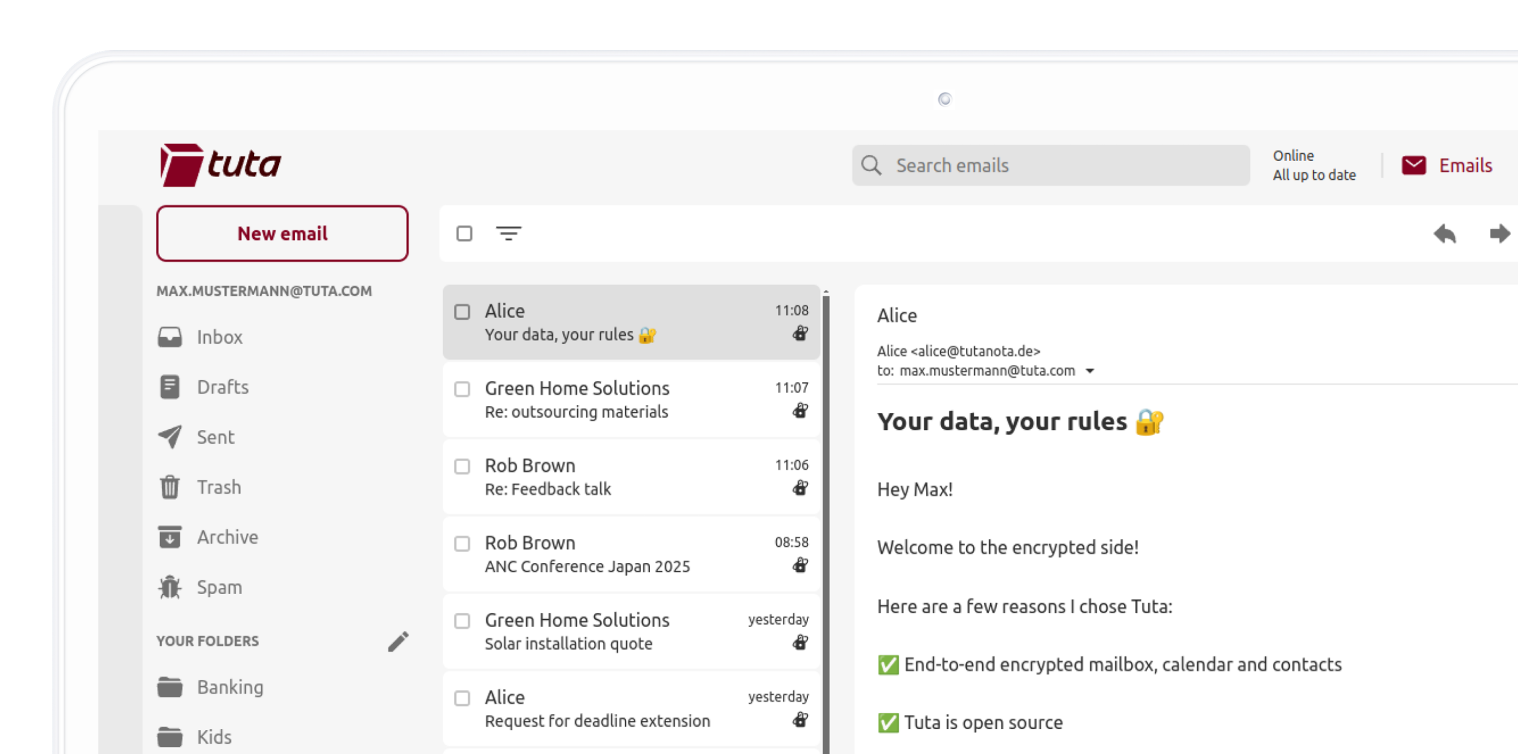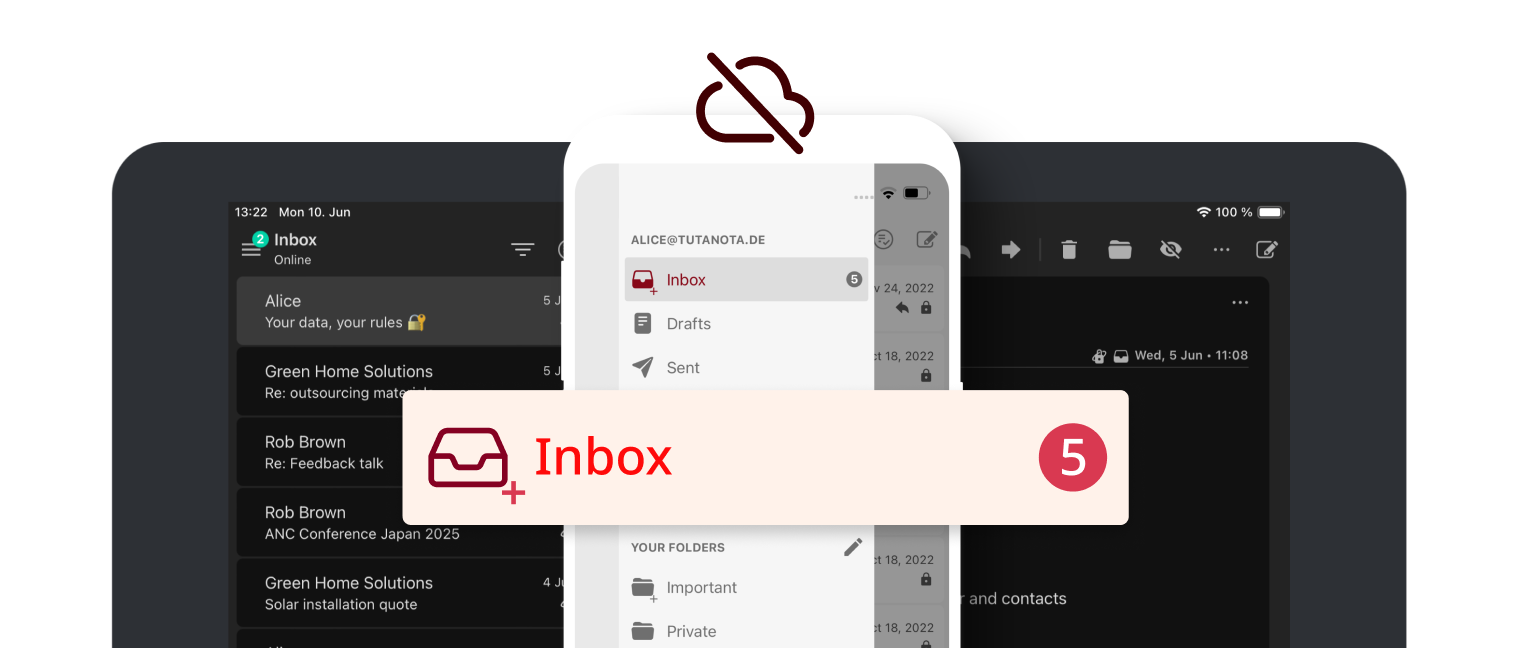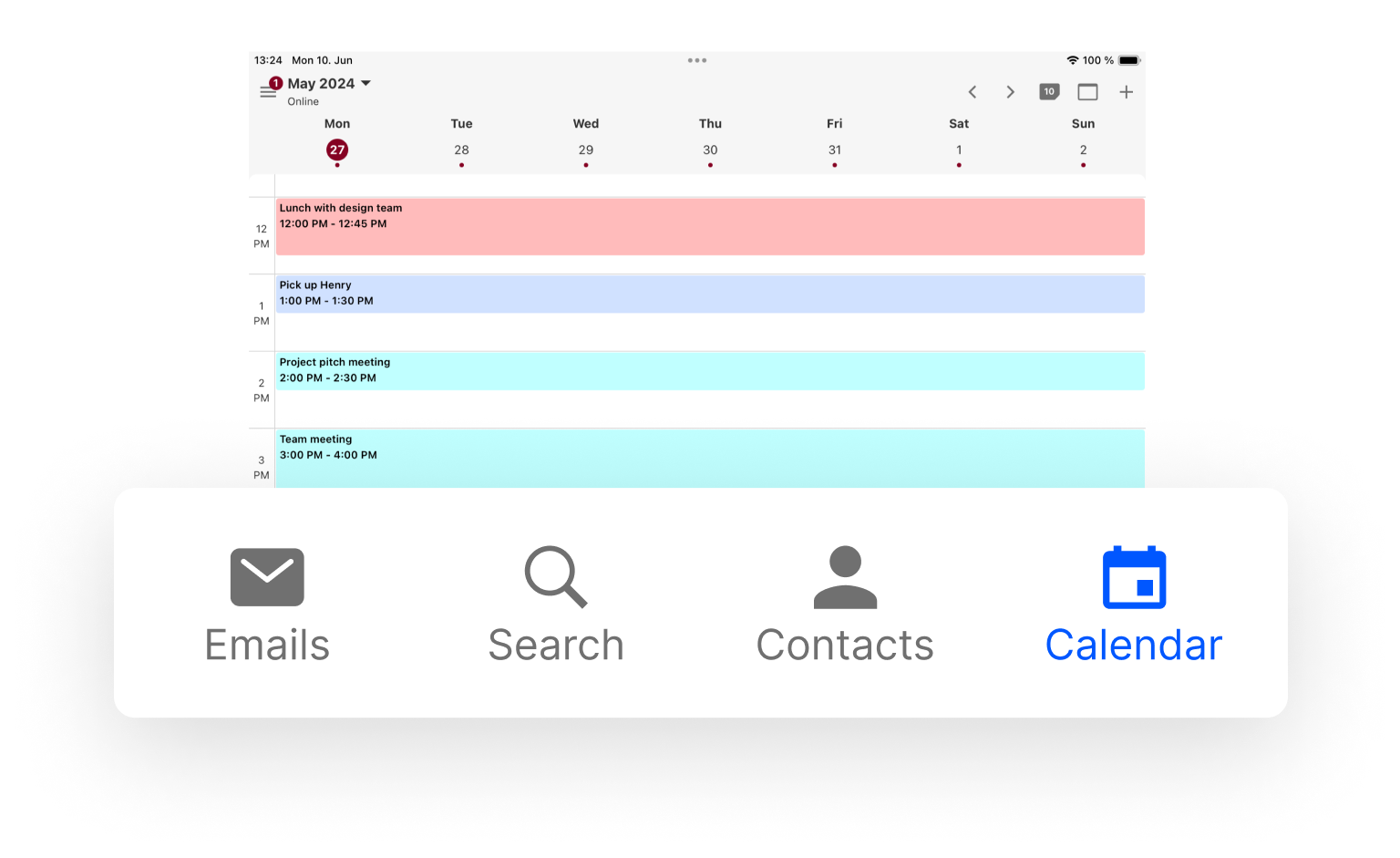Quantum-resistant encryption guarantees privacy
We secure your data to the maximum with quantum-safe encryption.
Our end-to-end encryption means your private data won’t go public. In contrast to mainstream email providers like Gmail, Outlook or Yahoo, Tuta Mail does not scan or track your emails.
We safeguard your entire mailbox, calendars and contacts, making sure no one can spy on your personal information. Not even we at Tuta can decrypt and read your emails. Join our privacy revolution now!

We secure your data to the maximum with quantum-safe encryption.
The ease and simplicity of our apps lead to an organized workflow.

The free Tuta mail apps for Android and iPhone let you use email on the go.

Use two-factor authentication to protect your email account from attacks.
Benefit from smart protection against spam and phishing as well as built-in tracking blockers in Tuta Mail.
Tuta Mail offers free and open source desktop clients for Windows, macOS and Linux.
Use your own custom domain to create unlimited email addresses.
Use Tuta Mail with your family, organization or company with multi-user support.
We believe that privacy is a human right and must not be abused by tech corporations, malicious attackers, or governments.
The protection of your privacy is not a priority to most big tech services like Gmail, Outlook, Yahoo and Apple Mail. It's time to turn on privacy with Tuta Mail!
Tuta Mail follows the principles of data minimization & privacy by design. We believe that everyone should have the right to freedom of speech and freedom of expression, and for that being able to communicate confidentially is vital. Being located in Germany, your data in Tuta benefits from strong data protection laws, including the European GDPR.
Read more on why privacy mattersTuta automatically encrypts all your data end-to-end, even email headers and metadata such as subject lines so that your personal and business emails stay private.
Read more on Tuta Mail's encryptionTuta Mail is free secure email so that everyone can keep their conversations confidential. We believe that privacy is a human right, and we are happy that many of our users choose to support our fight for a better web by upgrading to a paid plan, thus, enabling us to offer free accounts to those in need.
Read more on how you pay with your data for free servicesWith Tuta Mail you remain anonymous. Unlike big tech email providers, we do not ask for a phone number to create an email account. By default, we do not log IP addresses. We do not scan your emails or track you. We make sure that your communication can not be abused for tracking or personalized ads. Your data remains with you and it is never shared or sold to third-party advertisers or other entities.
Read more on how to create an anonymous email accountAll our email clients are open source and we own our infrastructure, including our servers. While other email providers rely on closed-source services for data hosting, captcha, push notifications, and desktop clients, we’ve built our own solutions for these tasks, making Tuta the best open source email provider available.
Read more on open sourceAt Tuta we build a private email solution that safeguards your personal and business data. We offer an ethical alternative to surveillance capitalist services that track and abuse your data. That's why Tuta has a fair and transparent salary for all employees, uses only renewable energy, and chooses respect for privacy over profit maximization.
Read more on our ethics
We make sure that no one but you and the intended recipient can view and read your emails. This is the strongest defense to protect your sensitive data.
Tuta Mail comes with seamlessly integrated encrypted calendars and contacts that sync instantly to the device of your choice. You can store all your data in a safe place, and possibly share them, knowing that no one can abuse your information.
Easily say "no" to Big Tech surveillance and turn on privacy!


Tuta Mail stores all your work emails encrypted on our own servers, based in Germany. Secure your business emails with quantum-safe encryption. With Tuta you own your data, no one else can access it.
Tuta (formerly known as Tutanota) was launched in 2014. Tuta Mail is a free secure email service provider, available globally. We are innovation leaders in encrypted email communication and have already launched quantum-safe cryptography in Tuta Mail.
Tuta is at the forefront of the privacy revolution and offers people private email accounts for free worldwide.
Create a secure email account in seconds by signing up for Tuta Mail for free or by choosing a paid plan. Registration takes less than a minute, no phone number is required and you can create an account anonymously. Simply log in to your new mailbox with your password to start communicating confidentially.
Quickly create a free email address by selecting “Free” when signing up for Tuta Mail. All security features like two-factor authentication, session handling, no tracking, and no ads are included in the free email version.
You can easily get a custom domain email address with Tuta Mail. All paid plans of Tuta Mail come with custom domain support, catch-all, and you can create an unlimited number of email addresses with your own domain.
Tuta uses symmetric (AES 256) and asymmetric encryption (RSA 2048 or ECC (x25519) and Kyber-1024 as quantum-safe algorithms to encrypt emails end-to-end. When both parties use Tuta, all emails are automatically end-to-end encrypted (asymmetric encryption). For an encrypted email to an external recipient, a password for encrypting and decrypting the message (symmetric encryption) needs to be exchanged once.
Tuta allows you to send encrypted, password-protected emails easily to anyone, no matter what mail provider they use.
Tuta Mail is the better privacy-focused alternative to Gmail because Tuta protects your private communication and enables you to send truly confidential emails. Unlike Gmail, Tuta has no access to your mailbox, and does not scan the contents of your messages. With Tuta, you are guaranteed that there is no tracking, no profiling, and no advertisements.
Big tech email providers like Gmail, Outlook, and Yahoo are not as private as they should be, and these providers can abuse your data. When you switch to a secure email provider like Tuta, you take back what is already yours: your privacy and your data. With Tuta, no one can use or abuse your data, giving you the freedom to communicate in full confidentiality. Especially for businesses, it's highly recommended to use a mail provider that encrypts as much data as possible and is fully GDPR compliant.
All your data in Tuta is stored on our own servers in ISO 27001-certified data centers in Germany and in full compliance with the GDPR. All data in Tuta is automatically encrypted so that only you can access your data. Not even we at Tuta can see your data.
Yes, you can access your mailbox offline from the device of your choice. With Tuta, you can open and decrypt your emails, calendars, and contacts simply by accessing the Tuta apps on Android, iPhones, Linux, macOS, or Windows, even when offline.